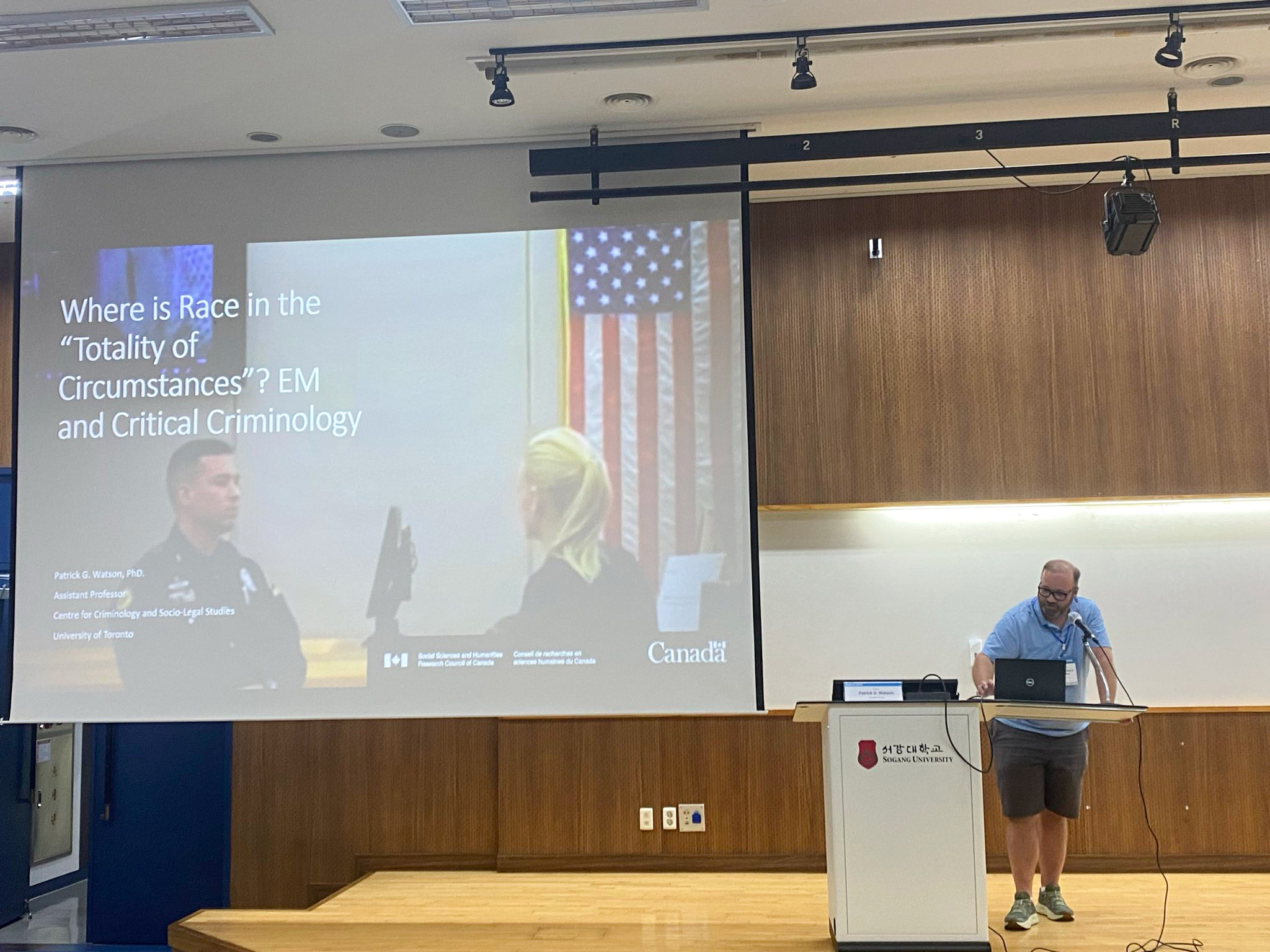CrimSL's Professor Patrick Watson recently returned from the 2024 conference of the International Institute for Ethnomethodology and Conversation Analysis (IIEMCA). IIEMCA 2024 was held at Sogang University in Seoul, Korea from June 25 to 28, 2024. The conference theme was "Positioning EMCA in the Digital Landscape."
Professor Watson is a well-known expert on ethnomethodology. He serves on the IIEMCA Board and also served on the conference's Scientific Committee.
Ethnomethodology is described by its founder, Harold Garfinkel, as an "asymmetrical incommensurate alternate" to sociology. It is the study of member's methods for producing social life as a situated, ongoing accomplishment. While studies in ethnomethodology have spanned various substantive interests, it has been particularly effective and well received in studies of science, technology and society, legal studies, and studies of policing. - Patrick Watson
Watson co-organized a pre-conference workshop entitled New Developments in Ethnomethodology for early career and PhD scholars
During the conference, Watson was one of the panel organizers for two sessions of Studies of Policing: Ethnomethodological Lessons for Policing’s ‘New Visibility’ on June 26, 2024.
Studies of Policing: Ethnomethodological Lessons for Policing’s ‘New Visibility’
Panel abstract
Policing has proved a productive field for ethnomethodological inquiry. Occupational exigencies of strong adherence to legal order combined with significant individual discretion create perspicuous sites for considering how rules’ meanings are derived from their use. Additionally, as policing has become more visible to both to ethnomethodologists and the public through video technology, new controversies have emerged in understanding what constitutes ‘good’ police work. The presenters on this panel will discuss how ethnomethodological approaches to inquiry can contribute to debates over policing and civilian police accountability. Panellists will draw on extensive experience of studying police training, police interrogation practice, police use-of-force inquiries, policing psychological crises, civilian police oversight reports, and inquiries into allegations of misconduct – including gender- based violence – against police officers. Panelists will consider moral and ethical concerns of studying police conduct, with a focus on Peter Manning’s distinction between studies for police and studies of police.
Watson also presented "Where is Race in the Totality of Circumstances? On Analyzing Absent Presences with Ethnomethodological Indifference" at the session Critical Studies and EM on June 27.

Where is Race in the Totality of Circumstances? On Analyzing Absent Presences with Ethnomethodological Indifference
Description
How do ethnomethodologists speak about Race when Race isn’t explicitly addressed in situated interaction? Following Sacks, I propose Race is omni-relevant to police trials, especially when the victim is racialized. I argue that ethnomethodology uniquely facilitates capacities to meet Alexander’s call to critique court processes used to produce colour-blind outcomes.
Abstract
My contribution to this panel draws on my studies of criminal trials for police officers charged in onduty shooting incidents where video served as key evidence. Videos of police violence, particularly violence enacted upon Racialized people, have drawn police conduct into serious contention and critique, with deeply polarized reactions to the 'necessity' for officers to resort to lethal force. Videos also can, and often do, make the racialized elements of these incidents self-evident. While race is often explicitly topicalized, albeit in a speculative manner, through public discourse surrounding these incidents, it is rarely included as an element of the 'totality of circumstances' when these cases come before the court. This is frustrating for ethnomethodologists who want to speak about these racialized dynamics but are hamstrung by the court-imposed prohibitions on mooting Race as an element of the alleged crime. How do ethnomethodologists, adhering to the indifference principle forwarded by Garfinkel, speak about Race when Race is not explicitly addressed in interactions endogenous to the setting of inquiry? I will proceed through this problem by arguing that Race is omni-relevant to police trials, especially when the victim is a racialized person. When Sacks introduced the notion of omnirelevant categories, he noted that such categories are not necessarily invoked, but remain constantly invoke-able. Various organizational factors prevent this in the court, but this does not mean that Race is not an ongoing achievement and concern through proceedings. Here, I will discuss how ethnomethodologists can conceptualize Race, and also critique the 'absent presence' of Race as a form of racial colour-blinding. My argument will be that ethnomethodology uniquely facilitates capacities to meet Michelle Alexander's (2011) call for examining and critiquing the processes used by courts to produce colour-blind outcomes.


